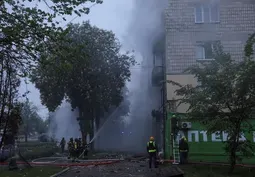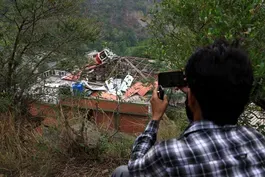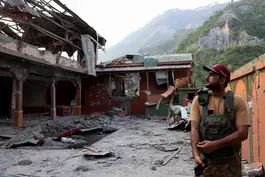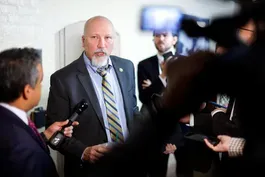
Social network brings people together in divisive times
Clip: 5/7/2025 | 9m 56sVideo has Closed Captions
How a social network is bringing people together in increasingly divisive times
Large social media platforms like Facebook, Instagram, X and TikTok have billions of users across the globe. The decisions they make about privacy, content moderation and misinformation can impact people’s social lives and mental health. A different kind of social network, one grown locally, might hold lessons for another way forward. Judy Woodruff reports for her series, America at a Crossroads.
Problems with Closed Captions? Closed Captioning Feedback
Problems with Closed Captions? Closed Captioning Feedback
Major corporate funding for the PBS News Hour is provided by BDO, BNSF, Consumer Cellular, American Cruise Lines, and Raymond James. Funding for the PBS NewsHour Weekend is provided by...

Social network brings people together in divisive times
Clip: 5/7/2025 | 9m 56sVideo has Closed Captions
Large social media platforms like Facebook, Instagram, X and TikTok have billions of users across the globe. The decisions they make about privacy, content moderation and misinformation can impact people’s social lives and mental health. A different kind of social network, one grown locally, might hold lessons for another way forward. Judy Woodruff reports for her series, America at a Crossroads.
Problems with Closed Captions? Closed Captioning Feedback
How to Watch PBS News Hour
PBS News Hour is available to stream on pbs.org and the free PBS App, available on iPhone, Apple TV, Android TV, Android smartphones, Amazon Fire TV, Amazon Fire Tablet, Roku, Samsung Smart TV, and Vizio.
Providing Support for PBS.org
Learn Moreabout PBS online sponsorshipAMNA NAWAZ: Large social media platforms such as Facebook, Instagram, X, and TikTok have billions of users across the globe.
And the decisions those companies make about privacy, content moderation and misinformation can impact people's social lives and mental health.
Judy Woodruff reports on how a different kind of social network, one grown locally, might hold lessons for another way forward IRL, or in real life.
It's part of her ongoing series, America at a Crossroads.
JUDY WOODRUFF: On a recent Tuesday evening in the Chapel of Saint Michael's College in Colchester, Vermont, the Freedom and Unity Chorus, a nod to the state's motto, is rehearsing for its upcoming concert at a nearby home hospice care.
The chorus is led by Maria Rinaldi, who works at Saint Michael's but lives 20 minutes away in the small town of Jericho.
To build the chorus, she went online, recruiting nearly every member through Vermont's most popular social media network, Front Porch Forum.
MARIA RINALDI, Vermont Freedom and Unity Chorus: I would ask people in my chorus who lived in different towns like Burlington to advertise on their Front Porch Forum or Essex or Colchester or whatnot, and so that's really how we started to build a larger chorus.
JUDY WOODRUFF: Rick Peyser and Betsy Evans both joined the chorus after seeing posts on their local forums.
RICK PEYSER, Vermont Freedom and Unity Chorus: It's like a community bulletin board.
I mean, people sell everything from chickens to tires.
But it's more than selling things.
BETSY EVANS, Vermont Freedom and Unity Chorus: If you need something or you even want to talk about something, there's discussions there.
JUDY WOODRUFF: I mean, I see baby items, sports gear.
MICHAEL WOOD-LEWIS, Front Porch Forum: Somebody wants to talk about an old church pew.
Someone's doing political organizing.
JUDY WOODRUFF: Twenty-five years ago, after moving to Burlington and struggling to connect with his neighbors, Michael Wood-Lewis started the LISTSERV that would become Front Porch Forum.
He says he became inspired by Robert Putnam's book "Bowling Alone" -- his copy still sits on his bookshelf - - to create something that helps neighbors build community through mundane interactions.
MICHAEL WOOD LEWIS: When neighbors have some trust, some track record of working with each other, of giving, borrowing, trading, then, when harder things come along, be it a house fire, a flood, even a contentious school budget debate, people have a level of trust.
I don't agree with John over there, but I know he's a good guy because he helped me clean up my gutters last week.
JUDY WOODRUFF: It's another approach to the growing problem of isolation.
Each day, people submit postings online, and, each day, a new edition of posts arrives to subscribers' inboxes.
To join, you must use your real name and live in the specific area defined by each of the more than 250 forums across the state.
There's no endless scrolling, no like button, and no comments section.
If you want to respond to a post, it won't show up until the next edition.
There's also no algorithm customizing users' experience.
Everyone in town sees the same thing.
MICHAEL WOOD-LEWIS: Unlike big tech social media, which is trying to pull you in and hold you in for 24/7, we really just want you for five or 10 minutes a day.
And then please put the phone down and go outside and talk to your neighbors.
JUDY WOODRUFF: Over in Essex Junction, Paul Lyons and Maggie Riley say they have grown tired of online echo chambers.
Lyons teaches music and plays in local bands, and he's used Front Porch Forum to find students.
Riley works in construction and on a farm.
She's used the forum to find furniture, truck accessories, and new hobbies.
On the day we visited, they were meeting in person for the first time at a music studio near Burlington after Maggie responded to Paul's Front Porch post seeking better conversations around political differences.
PAUL LYONS, Musician: I found that social media, it's just bubbles.
And so I found that it was just my own bubble talking back to me a bunch of stuff that I kind of already knew.
And I was like, well, yes, but what do other people think?
JUDY WOODRUFF: And, Maggie, you saw that posting that Paul had put out there.
What was your thought when you saw it?
MAGGIE RILEY, Construction Worker: I just thought that was like really nice and different than the way a lot of people nowadays think about politics.
Similar to Paul, I recently have just been thinking whichever side it's from, people are too angry at each other and not able to talk to each other.
PAUL LYONS: There's a disc golf course right around the block.
MAGGIE RILEY: Oh, I haven't noticed that.
JUDY WOODRUFF: Paul's post led to a 90-minute phone call.
They had some disagreements and decided to keep the contents of that conversation to themselves.
But they want to keep the dialogue going.
PAUL LYONS: Front Porch Forum is helpful, in that there's no comments section.
The only way you can connect with somebody is to connect with them.
It's not owned by billionaires.
It's not being used to extract time, energy and attention from people.
JUDY WOODRUFF: Front Porch Forum is free for its users, but makes money through local advertising, optional subscriptions with more access, and donations.
And while vigorous discussion is encouraged, personal attacks and misinformation are prohibited.
MICHAEL WOOD-LEWIS: Eight thousand members participate in this single neighborhood forum.
They saw this.
JUDY WOODRUFF: Around 12 moderators, all real people living in Vermont, review each post before it's published to ensure it complies with the terms of use.
MICHAEL WOOD-LEWIS: As long as people aren't spreading disinformation, aren't violating our rules in some other way, we welcome that content.
But it's challenging.
And in these times that we're in, these increasingly divisive, difficult times, it's gotten harder.
JUDY WOODRUFF: What do you think about the policy or approach of some of the other social media platforms that say, well, we need to let everybody speak for themselves and let them duke it out, so to speak, that we are all about free speech in this country?
MICHAEL WOOD-LEWIS: Yes, I don't buy it.
It's highly irresponsible.
They have created platforms with massive, massive power to change people's lives, and they're generating massive wealth for themselves and sucking a lot of that wealth out of local communities.
And they need to take more responsibility.
ELI PARISER, Co-Director, New_ Public: When you're controlled by one person, what that one person does has huge consequences.
JUDY WOODRUFF: Eli Pariser has been thinking about the Internet's impact on society and democracy for decades.
In the early 2000s, he led the progressive site MoveOn.org in opposition to the Iraq War and, in 2011, wrote "The Filter Bubble" about how online algorithms customize users' experience, while extracting and selling their personal information.
He now co-directs New_ Public, a nonprofit trying to shape online models to better promote democracy and civic engagement, especially at the local level.
ELI PARISER: So in physical communities, we have private businesses, but we also have libraries and parks and these other public institutions that just do different stuff.
And it's not to say that bookstores are bad.
Bookstores are great, but you need libraries too because there are things that bookstores will never do because they're organized as businesses.
I think, in the digital world, we have lived in this world that's just private companies that's 100 percent -- it's like organizing your whole society in a mall.
And building these public spaces that can really serve public needs seems like it needs to complement the private entities.
JUDY WOODRUFF: Last year, New_ Public and the University of Texas commissioned a survey of Front Porch Forum users.
It found that Front Porch Forum performed better than its much larger competitors, Facebook and Nextdoor, on key metrics like connecting users with where they live, treating people humanely and helping users feel more informed.
ELI PARISER: I think we can do better.
And I think we can do better by reinventing kind of what's the container, what's the business container that we're putting this in?
Does it have to make billions and billions of dollars or can it serve the public as well?
JUDY WOODRUFF: Back in Burlington, there's a question about whether Front Porch Forum could work beyond Vermont in more urban, more diverse and larger settings.
Pariser is working to create the digital tools to help others build their own models in communities across the country.
But while Michael Wood-Lewis: has a couple of pilot forums in neighboring states, he doesn't plan to expand Front Porch Forum.
MICHAEL WOOD-LEWIS: That's a whole other challenge that we would require a whole different kind of team and resources.
There are other people trying that and I applaud them.
But I think the solution that excites me is 1,000 different local solutions.
JUDY WOODRUFF: For the "PBS News Hour," I'm Judy Woodruff in Burlington, Vermont.
Examining Trump's latest hardline immigration policies
Video has Closed Captions
Clip: 5/7/2025 | 6m 22s | Examining Trump's latest hardline immigration policies and legal battles around them (6m 22s)
A look at difficult issues the next pope will face
Video has Closed Captions
Clip: 5/7/2025 | 8m 11s | As the conclave begins, a look at difficult issues the next pope will face (8m 11s)
News Wrap: Ukrainian drones disrupt flights in Moscow
Video has Closed Captions
Clip: 5/7/2025 | 6m 48s | News Wrap: Ukrainian drone attacks disrupt flights at Moscow's main airports for 3rd day (6m 48s)
Pakistan calls Indian strikes an act of war, vows to respond
Video has Closed Captions
Clip: 5/7/2025 | 3m 8s | Pakistan calls Indian strikes an 'act of war' and vows to respond (3m 8s)
Pakistani ambassador, Indian advisor share views on attacks
Video has Closed Captions
Clip: 5/7/2025 | 10m 54s | Pakistani ambassador, Indian advisor share perspectives on recent attacks and retaliation (10m 54s)
Rep. Chip Roy: GOP leaders need to 'show us the math'
Video has Closed Captions
Clip: 5/7/2025 | 6m 26s | Rep. Chip Roy says GOP leaders need to 'show us the math' in tax cut, Medicaid talks (6m 26s)
Providing Support for PBS.org
Learn Moreabout PBS online sponsorshipSupport for PBS provided by:
Major corporate funding for the PBS News Hour is provided by BDO, BNSF, Consumer Cellular, American Cruise Lines, and Raymond James. Funding for the PBS NewsHour Weekend is provided by...

















